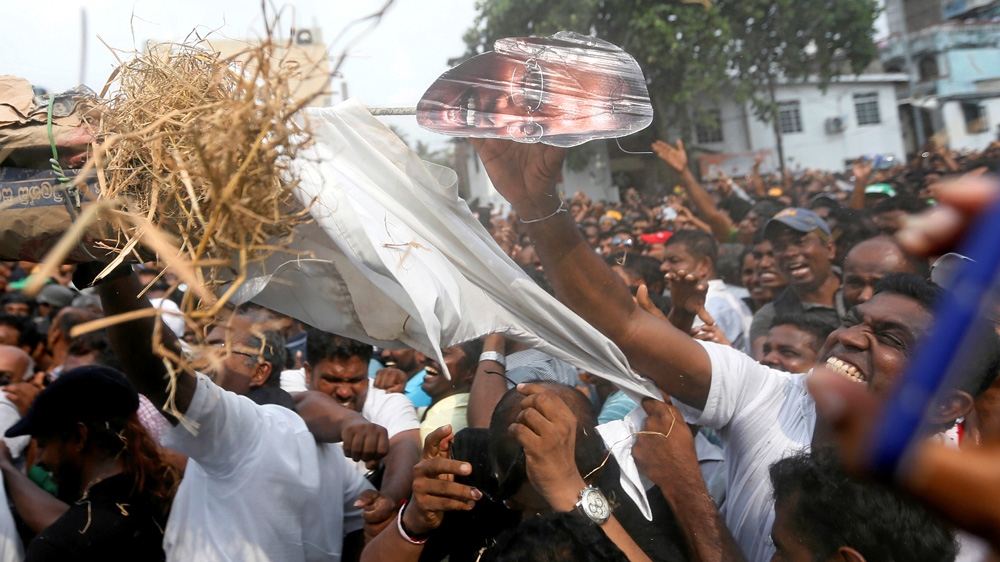Sri Lanka president dissolves parliament, sets January snap poll
Colombo, Sri Lanka – Sri Lanka‘s President Maithripala Sirisena has dissolved the country’s parliament and declared a snap election on January 5, hours after his coalition admitted that it could not muster enough parliamentary support for its designated prime minister.
The move on Friday was the latest twist in a protracted political crisis triggered by the president’s shock move last month to sack Prime Minister Ranil Wickremesinghe and replace him with Mahinda Rajapaksa, a controversial former president.
Sirisena said in an official gazette notification that the dissolution of the currently suspended parliament will take effect at midnight, and a new legislature will be summoned to meet on January 17.
Wickremesinghe’s United National Party (UNP) swiftly denounced the move in a post on Twitter, saying it “vehemently rejects” the sacking of the parliament.
The party also accused Sirisena of robbing the “people of their rights and democracy”.
The UNP argues the president has the authority to appoint the prime minister, but does not have the power to sack the incumbent. It has demanded a parliamentary vote to prove Wickremesinghe’s majority.
The deposed leader, meanwhile, has remained holed up in the prime ministerial residence since his abrupt dismissal on October 26.
Dayasiri Jayasekara, a cabinet minister, told Al Jazeera that Sirisena had no choice but to dissolve parliament because of Wickremesinghe’s refusal to step down.
The president was acting well within his constitutional rights in dismissing the parliament, Jayasekara stressed, adding: “The best thing to do now is go for an election. This is what the people also want.”
Rajapaksa also welcomed Sirisena’s move, saying in a Twitter post that a “general election will truly establish the will of the people and make way for a stable country”.
The dissolution of the parliament comes amid weeks of intensified horse-trading as opposing parties fought to obtain a majority of 113 legislators in the 225-member parliament.
Sirisena’s United People’s Freedom Alliance (UPFA), which had the backing of 96 legislators prior to the crisis, has managed to woo at least nine legislators to switch support in the past two weeks.
|
Sri Lanka parliament speaker refuses to recognise Rajapaksa as PM |
However, the UNP – whose numbers declined from 106 to 98 amid defections – gained an edge when the Tamil National Alliance, a coalition of 15 legislators representing the country’s ethnic Tamil minority, said it would back a motion to remove Rajapaksa when parliament reconvened on November 14.
Earlier on Friday, Keheliya Rambukwella, spokesperson for the UPFA, admitted for the first that the coalition did not have a majority.
“We now have 104 or 105 seats, but we will show a majority of 113 and more on the parliament floor,” he told a news conference.
Mixed responses
 |
| Supporters of the ousted Wickremesinghe have taken part in daily protests since his dismissal [Dinuka Liyanawatte/Reuters] |
Rajitha Keerthi Tennakoon, a political analyst based in Sri Lanka’s capital, Colombo, said the dissolution of parliament was “the only way out of the constitutional crisis”.
“It would have been better if the president had asked for the opinion of the Supreme Court, but the constitution does not make that mandatory.”
Others, however, disagreed.
Shreen Saroor, a human rights activist who has been leading daily protests against Sirisena’s decision to sack Wickremesinghe, called the dissolution of parliament “yet another unconstitutional move”.
“He did this because he knew that he would not get a majority for Rajapaksa. He has now set a precedent for any future leader to exercise maximum power,” she said.
The parliament’s dismissal will allow Sirisena to keep Rajapaksa and the new cabinet of ministers, opening the door for the new government “to abuse resources for the forthcoming election”, she argued.
Gehan Gunatilleke, a human rights lawyer, said Sirisena’s move may end up increasing the UNP’s chance at winning the election.
“Unconstitutional behaviour of this magnitude can be very damaging electorally,” he said.
“Voters who may have previously been unimpressed by the generally lacklustre performance of the UNP will now be spurred to action to prevent Sirisena and Rajapaksa from winning an election.”




